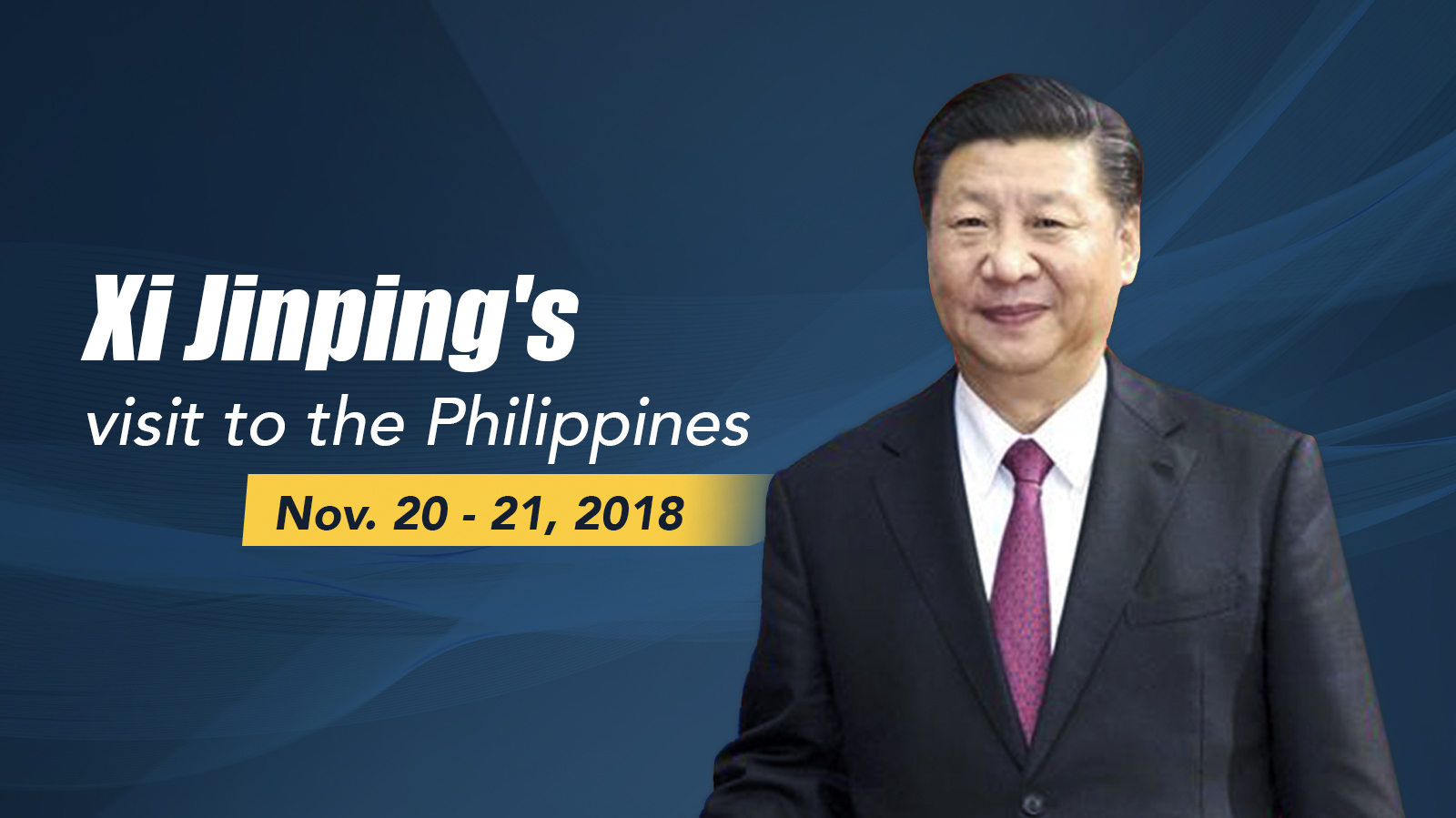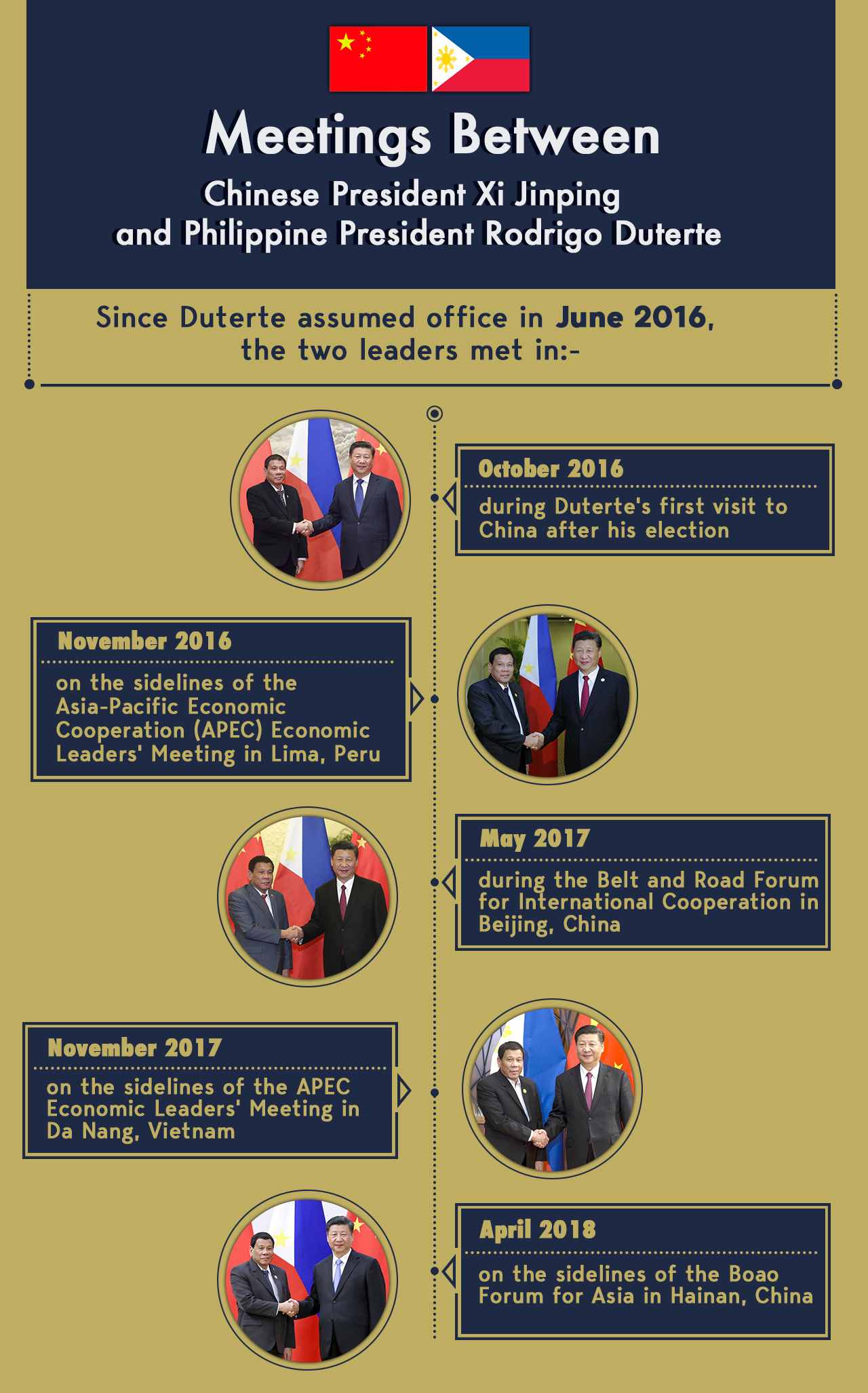
Politics
23:02, 19-Nov-2018
Xi Jinping's Philippines visit is a further step to better ties
Updated
22:23, 22-Nov-2018
By Zhou Jingnan

"Since President Duterte took office, China and the Philippines have reengaged in dialogue and consultation for the proper handling of the South China Sea issue. Our relations have now seen a rainbow after the rain."
This is a quote from Chinese President Xi Jinping's signed article published in Philippine newspapers right before his visit to the country, which will take place on November 20 to 21.
Read more:
The quote is also a precise conclusion to the thawing bilateral ties which had soured because of an arbitral tribunal ruled in favor of the administration of former Philippine President Benigno Aquino III on the South China Sea dispute.
China refused to recognize the decision, saying that the dispute should be settled through bilateral negotiations.
Since Rodrigo Duterte assumed office in the middle of 2016, he has actively sought re-engagement with China, which can be seen in the frequency of his meeting with President Xi.

In those meetings, China and the Philippines have agreed to closely cooperate in various areas, such as energy and infrastructure, where the two countries are highly complementary.
The broad consensus has brought fruitful achievements, as President Xi pointed out in the signed article: "In just a little more than two years, China has become the Philippines' largest trading partner, largest export market and largest source of imports, and the second largest source of tourists."
A smooth Sino-Philippine relationship possible
The relations between China and the Philippines have been significantly enhanced, not only because of the stronger trade and economic cooperation, but also because of the general peace and stability in the South China Sea.
The negotiations for a Code of Conduct (COC) in the South China Sea between China and the Association of the Southeast Asian Nations (ASEAN) had a major breakthrough this August, when both sides arrived at a single draft of negotiating text of the COC.
The draft text will serve as the basis for future COC negotiations.
Ahead of President Xi's visit to the Philippines, Chinese State Councilor and Foreign Minister Wang Yi paid a visit to the country at the end of October.
When meeting with Wang, the Philippine president said that the current ties between China and the Philippines are developing along a very positive line, with the only issue being the South China Sea dispute.
But on this issue, Duterte emphasized that the Philippine side firmly believes that peace is the only correct choice and pledged to work with China to maintain peace and stability in the region.
Wang Yi pointed out that the dispute concerning the South China Sea should not be the hurdle for the development of the bilateral ties. He also urged the Philippines to play an active role in the negotiation of the COC as the new coordinator of China-ASEAN dialogue relations.
Earlier reports suggested that Duterte had approved a proposal to form a group to study plans for a joint exploration in the South China Sea between China and the Philippines.
It is worth noting that China's consistent proposal of "Shelving disputes and joint exploration" have yet to become a reality in the disputed maritime territory.
The first visit by a Chinese head of state in 13 years
This visit by President Xi to the Philippines will be the first in 13 years.
According to the Chinese Foreign Ministry, the two state leaders are expected make a new strategic planning for the future course of the Sino-Philippine relationship, and comprehensively upgrade pragmatic collaboration across the board.

In April this year, when the two met during the Boao Forum for Asia in China, Xi said China and the Philippines have taken "two steps upward" and moved from a rapid turnaround to a consolidated relationship in the past two years.
"The task of this year shall be upgrading the relationship," Xi said.
For his part, Duterte once likened the ties between Manila and Beijing to a blossoming flower: "It's like a flower that would bloom into something big and beautiful."
Whether poetically described as a "blossoming flower" or more prosaically considered an "upgraded relationship", the message of striving for a better partnership that's conducive economically and politically is loud and clear from both sides.
(Infographics by Yin Yating, Li Jingjie. Top image by Du Chenxin)
(With input from Xinhua)

SITEMAP
Copyright © 2018 CGTN. Beijing ICP prepared NO.16065310-3
Copyright © 2018 CGTN. Beijing ICP prepared NO.16065310-3